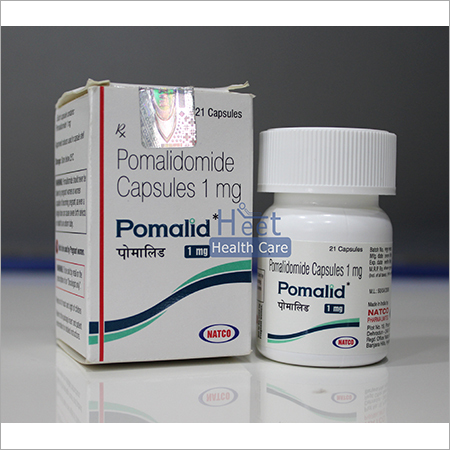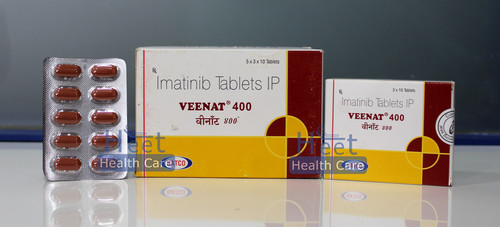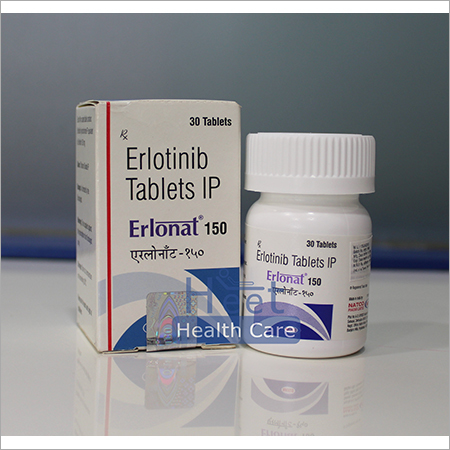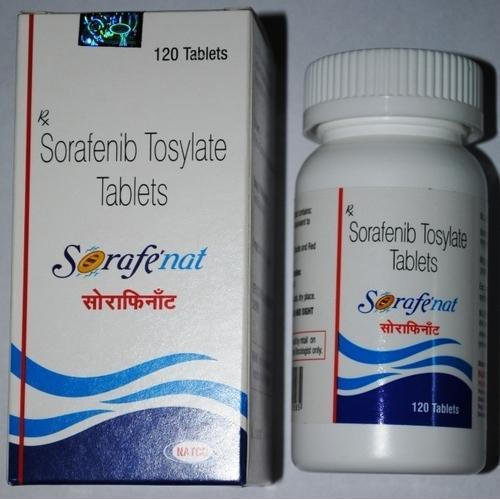Pomalid Pomalidomide 1mg
Price 9000 INR/ Box
Pomalid Pomalidomide 1mg Specification
- Origin
- India
- Dosage Form
- As Per Suggestion
- Feature
- Other
- Ingredients
- Other
- Application
- Other
- Storage Instructions
- Cool & Dry Place
- Shelf Life
- 2 Years
Pomalid Pomalidomide 1mg Trade Information
- Minimum Order Quantity
- 10 Boxes
- FOB Port
- Delhi, Mumbai
- Payment Terms
- Letter of Credit (L/C), Letter of Credit at Sight (Sight L/C), Telegraphic Transfer (T/T), Paypal, Western Union, Cash in Advance (CID), Cheque, Cash Advance (CA)
- Supply Ability
- 10000 Boxes Per Month
- Delivery Time
- 7 Days
- Packaging Details
- Pack of 21 capsules
- Main Export Market(s)
- Australia, North America, Eastern Europe, Africa, Western Europe, Central America, Middle East, South America, Asia
- Main Domestic Market
- All India
About Pomalid Pomalidomide 1mg
Pomalidomide, an immunomodulatory drug used to treat the blood cancer multiple myeloma, is the substance that makes up Pomalid 1mg. Patients who have had prior treatments but have relapsed or are resistant to other therapy are prescribed it. Pomalidomide suppresses the growth of cancer cells and modifies the immune system to work. Patients can take the drug conveniently because it comes in capsule form to be swallowed. To address potential side effects, which may include low blood cell counts, tiredness, and an elevated risk of infections, regular medical monitoring is crucial during treatment. For individuals with relapsed or refractory multiple myeloma, pomalid 1 mg offers a focused therapeutic alternative.
Features and Advantages of Pomalid 1mg Pomalidomide:
Features:
1. Pomalid, the active ingredient Pomalidomide, an immunomodulatory drug, is the active component of malidomide 1 mg.
2. Oral Administration: Patients can conveniently administer the drug at home because it is administered orally in capsule form.
3. Treatment for Multiple Myeloma: Pomalidomide has been specially approved to treat multiple myeloma in individuals who have already had therapy but have relapsed or are resistant to other forms of treatment.
4. Pomalidomide alters the immune system, which improves its capacity to recognise and combat cancer cells.
5. Combination Therapy: It is frequently used in conjunction with other drugs to increase their efficacy.
Benefits:
1. Pomalidomide's main advantage is its capacity to stop cancer cells from growing and dividing, which causes tumours to regress and shrink.
2. Pomalidomide medication has been linked to enhanced overall survival and progression-free survival in individuals with multiple myeloma that has relapsed or become resistant to other treatments.
3. Pomalidomide provides tailored therapy by concentrating on particular pathways involved in the proliferation of cancer cells, which may have less adverse effects than conventional chemotherapy.
4. Immunological Enhancement: Pomalidomide improves the body's immunological response, making it easier to find and get rid of cancer cells.
5. Bone marrow Stimulation: It may boost the creation of healthy blood cells by stimulating bone marrow activity.
6. Complimentary Therapy Synergy: Pomalidomide can have beneficial benefits when combined with other drugs, improving the effectiveness of treatment.
7. Pomalidomide is generally well tolerated and has controllable adverse effects.
8. Outpatient Care: Pomalid Pomalidomide 1mg can frequently be given outside of the hospital, avoiding lengthy hospital stays.
9. Pomalidomide use enables a personalised treatment strategy based on the features of the tumour and the specifics of the patient.
10. Research is still being done, and new combinations and uses of the drug are being explored in clinical trials. This is resulting in more therapy options for people with multiple myeloma.
Before beginning Pomalidomide treatment, individuals must discuss potential adverse effects and advantages with their doctor. To manage potential side effects and achieve the greatest results, regular medical monitoring is essential. It takes knowledge to utilise Pomalid Pomalidomide 1mg, and treatment choices should be determined in collaboration between patients and their oncologists while taking into account specific circumstances and therapeutic objectives.
Pomalid Pomalidomide 1mg uses:
Pomalid Patients with multiple myeloma who have previously had treatment but have relapsed or are resistant to various forms of therapy are often treated with 1 mg of pomalidomide. A form of blood cancer known as multiple myeloma affects plasma cells in the bone marrow. For individuals with relapsed or refractory multiple myeloma, pomalidomide offers a targeted therapy option by altering the immune system and preventing the proliferation of cancer cells.
Pomalid Pomalidomide 1mg Side Effects:
1. Pomalidomide can have a number of adverse effects, and each person will likely experience them to varying degrees. Typical negative consequences could be:
2. Pomalidomide can cause low blood cell counts, which increases the risk of infections, anaemia, and bleeding issues. Pomalidomide can also diminish the number of white blood cells, red blood cells, and platelets.
3. Weakness or weariness may strike certain patients while they are receiving treatment.
4. Pomalidomide may make some patients feel nauseous and sick to their stomachs.
5. Constipation or Diarrhoea: Digestive issues like constipation or diarrhoea could happen.
6. Skin Rash: Some people may experience skin sensitivities or rashes.
7. Pomalidomide may cause peripheral neuropathy, which can result in tingling, numbness, or discomfort in the hands and feet.
8. Fever: A possible side effect is fever.
9. Dizziness: Some people may become lightheaded or feel dizzy.
10. Blood Clot Risk Increasing: Pomalidomide may make blood clots more likely.
11. Cardiac Toxicity: In very rare instances, it may have adverse effects on the heart.
During the course of their Pomalid Pomalidomide 1mg medication, patients must instantly inform their doctor of any worrying symptoms. To manage potential adverse effects and maximise therapy effectiveness, routine blood tests and medical monitoring are required. Pomalidomide use requires knowledge, and treatment choices should be determined in collaboration between patients and their oncologists while taking into account specific circumstances and therapeutic objectives. To manage side effects and guarantee the best treatment outcomes, patients should be regularly watched and given supportive care.


Price:
- 50
- 100
- 200
- 250
- 500
- 1000+
More Products in Anti Cancer Medicine Category
Nublexa 40 mg Tablet
Price 35000 INR / Box
Minimum Order Quantity : 1 Box
Storage Instructions : It Is Stored Below Room Temperature 25C
Dosage Form : As Per Suggestion
Origin : India
Shelf Life : 2 Years
Veenat Imatinib Mesylate 400mg Tablets
Price 2500 INR / Box
Minimum Order Quantity : 100 Boxes
Storage Instructions : Cool & Dry Place
Dosage Form : As Per Suggestion
Origin : India
Shelf Life : 2 Years
Erlocip Erlotinib Tablets IP 150 mg
Price 5000 INR / Box
Minimum Order Quantity : 10 Boxes
Storage Instructions : Cool & Dry Place
Dosage Form : As Per Suggestion
Origin : India
Shelf Life : 2 Years
Sorafenib Tosylate Tablet
Price 8000 INR / Box
Minimum Order Quantity : 1 Box
Storage Instructions : Cool & Dry Place
Dosage Form : As Per Suggestion
Origin : India
Shelf Life : 2 Years
 |
HEET HEALTHCARE PVT. LTD.
All Rights Reserved.(Terms of Use) Developed and Managed by Infocom Network Private Limited. |

 Send Inquiry
Send Inquiry English
English Spanish
Spanish French
French German
German Italian
Italian Chinese (Simplified)
Chinese (Simplified) Japanese
Japanese Korean
Korean Arabic
Arabic Portuguese
Portuguese Send Inquiry
Send Inquiry




